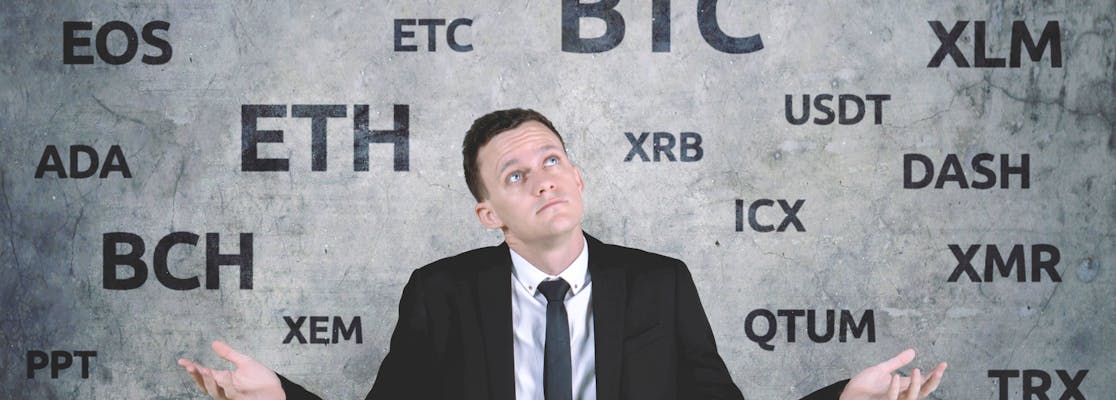What Is the Best Crypto to Buy in 2024?
All products and services featured are independently selected by WikiJob. When you register or purchase through links on this page, we may earn a commission.
76% of eToro retail CFD accounts lose money. Don’t invest unless you’re prepared to lose all the money you invest. This is a high-risk investment and you should not expect to be protected if something goes wrong. Take two mins to learn more.
- Best Crypto to Invest in 2024 – Top 11 List:
- Description of the Best Crypto to Buy Now in April 2024
- Which Crypto to Buy Today For Long-Term?
empty
empty
empty
empty
- Why Are There Different Types of Cryptocurrencies?
- What Can You Buy With Cryptocurrency?
empty
empty
empty
empty
empty
- How to Decide Which Crypto to Buy in 2024
- Frequently Asked Questions
- Final Thoughts
Best Crypto to Invest in 2024 – Top 11 List:
- Bitcoin – Best Crypto for Beginners
- Bitcoin Cash – A Leader Among Top Altcoins
- Ethereum – One of The Fastest Growing Cryptocurrency
- Binance Coin – Relatively Strong Crypto
- Litecoin – Best Crypto for Fast Transactions
- Cardano – One of The Cheapest Cryptocurrency to Buy
- Tether – One of the Most Stable Cryptocurrency
- XRP – A Fast & Cheap Crypto to Buy
- Dogecoin – One of the Top Altcoins to Watch
- Stellar – One of the Best Altcoins to Invest In
- Polkadot – One of the Best Altcoins to Buy With Low Fees
Don’t invest in unless you’re prepared to lose all the money you invest.
Description of the Best Crypto to Buy Now in April 2024
1. Bitcoin
Pros
- Decentralization
- Limity supply
- Security
- Anonymity
Cons
- Volatility
- Regulatory uncertainty
- Irreversible transactions
Market value: Currently around $826 billion
Bitcoin was the forerunner of all the cryptocurrencies, and remains the most popular option for those looking to invest in this alternative form of currency. Many brokers consider it the best crypto to day trade as well as a long term crypto investment.
Bitcoin has almost reached its market limit of coins (set at 21 million) and it is the hardest to mine – with arrays of computers and a huge amount of processing needed. It has recently come under fire for the negative impact on the environment through energy use.
Bitcoin has rocketed in value – coins that were given away for small actions online are now worth tens of thousands of dollars – and it remains the biggest cryptocurrency in terms of market share available.
2. Bitcoin Cash
Pros
- Faster transactions than bitcoin
- Lower transaction fees compared to bitcoin
- Mainstream awareness of Bitcoin brand
- Global accessibility
- Decentralization
Cons
- Controversy and forks within the Bitcoin Cash community
- Market volatility
- More susceptible to certain types of attacks
- Competition from other cryptocurrencies
- Regulatory uncertainty
Market value: Currently at $20.1 billion
Bitcoin Cash was created following a hard fork from Bitcoin in 2017.
Although almost everything about the structure and format of Bitcoin Cash is the same as Bitcoin, the difference (and the reason for the hard fork) is the block size. Bitcoin has a 1MB block, where Bitcoin Cash has 5MB – enabling it to manage more transactions.
3. Ethereum
Pros
- Increased scalabiltiy
- Fast transactions
- Lower fees
Cons
- Centralization concerns
- Divisive community
- Lack of widespread adoption
Market value: Currently at $390 billion
Ethereum is a very important blockchain for app developers and those who are interested in a completely decentralized world – featuring smart contracts and special decentralized apps.
Ether is the name of the token created for use on the Ethereum blockchain, and it started as a token just for use within Ethereum. However, the unlimited number of tokens and the application of ether for use in smart contracts and as a tradable commodity has made it a popular option.
The ether source code is freely available, and in fact it is the basis for a large number of new altcoins and initial coin offerings (ICOs).
4. Binance Coin
Pros
- Utility within Binance ecosystem
- Token burns
- Wide rage of use cases
- Strong exchange backing
Cons
- Centralization concerns
- Dependence on exchange success
- Regulatory risks
- Volatile market
Market value: Currently at $79.5 billion
With a total number of tokens set at 200 million, the Binance Coin was originally designed in 2017 as a payment token to be used for discounted trading fees when using the Binance platform.
As an established altcoin, Binance Coin has a high market value and is relatively steady in comparison to the volatility of some other cryptocurrencies. Every quarter, Binance buys back coins and ‘burns’ them, destroying a portion so the value (and scarcity) grows, driving demand.
5. Litecoin
Pros
- Faster transactions
- Scalabilty
- Active development
Cons
- Competition with other cryptos
- Limited unique features
- Volatile market
Market value: Currently about $14 billion
Litecoin is based on the Bitcoin source code and was created in 2011 by Charlie Lee, a former Google employee and MIT graduate.
Litecoin was specifically designed to be less bulky than Bitcoin, so that transactions can be completed faster.
6. Cardano
Pros
- Research-driven approach
- Scalability
- Interoperability
Cons
- Early stage development
- Competition
- Complexity
Market value: Currently $66.3 billion
Cardano was founded by Charles Hoskinson, one of the Ethereum founders, as a complete financial operating system. It has been described as the ‘Ethereum Killer’ because it is based on the same blockchain, but with loftier values.
Cardano relies on a Proof of Stake (PoS) consensus, which is a newer way for transactions to be validated than the usual Proof of Work (PoW).
7. Tether
Pros
- Stability
- Liquidity
- Cross-exchange arbitrage
- Faster transactions
Cons
- Centralization concerns
- Lack of auditing
- Regulatory scrutiny
Market value: Currently at $58.2 billion
Tether is what is known as a stablecoin. These cryptocurrencies have a value that is tied to a physical asset – and in this case, it is ‘tethered’ to the US dollar. It was launched in 2014, and one Tether coin is worth $1.
This connection makes Tether much less volatile than other cryptocurrencies, and with no cap on the amount of Tether coins available, it could be considered a ‘safer’ option for investors.

8. XRP
Pros
- Fast transactions
- Low transaction costs
- Liquidity provider
Cons
- Lawsuits and regulatory uncertainty
- Centralization concerns
- Market manipulation claim
Market value: Currently at $51.8 billion
Ripple is the creator of the XRP coin. This coin is mainly used to facilitate the scaling of digital payments worldwide using the RippleNet digital payment platform.
XRP is different from other cryptocurrencies because it cannot be mined, and the transactions are not verified through the blockchain, but they are faster and cheaper than using Bitcoin when put through the RippleNet platform.
9. Dogecoin
Pros
- Community and branding
- Low transaction fees
- Fast transactions
Cons
- Lack of clear use case
- Limited development
- Dependency on Sentiment
Market Value: Currently $63.4 billion
Using the Bitcoin source code, Dogecoin was created as a joke mocking the principles of cryptocurrency in 2013 by Billy Markus and Jackson Palmer.
Known as the first ‘memecoin’, Dogecoin is recognizable by the Shiba Inu mascot that was a popular theme in the memes of the time.
Dogecoin has had a very volatile pricing history, but thanks to the seeming support of big-time entrepreneur Elon Musk, Dogecoin is one of the biggest cryptocurrencies in the market.
10. Stellar
Pros
- Fast transactions
- Low transaction costs
- Focus on financial inclusion
Cons
- Competition
- Regulatory challenges
- Volatile market
Market value: Currently around $8 billion
Created in 2014 by Jed McCaleb (one of the founders of Ripple), Stellar is a start-up financial services platform that was created to make fast, cheap transactions the norm. It uses a cryptocurrency called Lumens to fund it and also support the blockchain that makes the transactions possible.
Stellar and Lumens were created in collaboration with other financial businesses like Stripe.
11. Polkadot
Pros
- Interoperability
- Scalability
- Security
Cons
- Complexity
- Competition
- Early stage development
Market value: Currently $30.5 billion
The Polkadot cryptocurrency was co-founded by a man named Gavin Wood, who was also a co-founder of Ethereum. Although Polkadot was only founded in 2020, it has become popular thanks to the technology and vision of the business.
Polkadot runs two blockchains – a ‘relay’ chain that makes all the transactions permanent and a user-created ‘parachain’ that can be customized to create decentralized apps, for example.
This tech, alongside an aim to reduce problems with interoperability between blockchains, is something that investors are interested in.
76% of eToro retail CFD accounts lose money. Don’t invest unless you’re prepared to lose all the money you invest. This is a high-risk investment and you should not expect to be protected if something goes wrong. Take two mins to learn more.
Which Crypto to Buy Today For Long-Term?
When considering the which cryptoc to buy today for long-term investments, it's important to conduct thorough research and consider factors such as technology, adoption potential and the project's overall vision.
While the cryptocurrency market can be highly volatile, there are some options that stand out as potential candidates for long-term crypto investment.
Here are a few noteworthy choices for the best long-term cryptos:
Bitcoin (BTC)
As the first and most well-known cryptocurrency, Bitcoin remains a popular choice for long-term investors. Its limited supply, decentralized natur, and recognition as a store of value contribute to its appeal.
Bitcoin has demonstrated resilience and a history of price appreciation, making it a potential hedge against inflation.
Ethereum (ETH)
Ethereum is a leading smart contract platform that enables the creation of decentralized applications and tokens.
With the upcoming Ethereum 2.0 upgrade, the network aims to improve scalability and energy efficiency. As the foundation of the decentralized finance (DeFi) and non-fungible token (NFT) ecosystems, Ethereum's utility continues to expand.
Cardano (ADA)
Cardano stands out for its scientific research-driven approach and focus on scalability and sustainability. It aims to provide a balanced and secure blockchain ecosystem.
Cardano's ongoing development and partnerships make it a contender for long-term growth.
Polkadot (DOT)
Polkadot's multi-chain platform enables interoperability between blockchains, enhancing scalability and communication.
Its unique architecture and shared security model offer potential benefits for a diverse and collaborative blockchain ecosystem.
When considering a long-term investment, it's essential to diversify your portfolio and avoid putting all your funds into a single asset.
Additionally, the concept of staking, where you lock up your cryptocurrency to support network functions and earn rewards, is gaining popularity. The above are the best cryptos to stake.
Cryptocurrencies like Cardano (ADA), Ethereum (ETH), and Polkadot (DOT) are some of the best staking crypto opportunities that could provide passive income over time.
Why Are There Different Types of Cryptocurrencies?
The original cryptocurrency was first created in 2009 by an entity known by the pseudonym 'Satoshi Nakamoto'.
Designed to be an alternative form of currency, with no government oversight, no ties to any physical asset and security based on cryptography provided by blockchain technology, Bitcoin was the only option until 2011, when other alternative coins started to become available.
In the spirit of competition – and often to improve on the original Bitcoin technology – different cryptocurrencies have sprung up in the last 10 years.
The very nature of the decentralized digital currencies and the blockchains they are based on means that all the details needed to create another altcoin is freely available as open-source code. The number of new crypto projects is therefore constantly growing – but deciding which to buy can be a difficult decision.
Cryptocurrencies are often described as an alternative form of currency that does not rely on tangible assets for value. As a virtual currency, it can work across borders without government manipulation or concerns about fluctuating prices of things like gold (unlike fiat currency).
With the availability of source code for existing altcoins, as well as different blockchain options, it is straightforward for a developer to use one altcoin as a basis for creating another – like Litecoin.
However, new cryptocurrencies can also be made during what is known as a hard fork – where disagreements between developers lead to a new currency being created, often using the same technology but with some important distinctions, like Bitcoin and Bitcoin Cash.
What Can You Buy With Cryptocurrency?
Although the original cryptocurrency was designed as a digital, decentralized replacement for traditional (fiat) currency, people use altcoins and tokens for any number of reasons.
Invest in Cryptocurrencies
As an exciting and relatively new way to invest, cryptocurrency offers traders opportunities to create both long- and short-term investments.
A large number of cryptocurrencies are available to trade on many markets, and with high volatility as one of the main features of this digital money, crypto is perfect for day traders and those with a long-term plan.
Investing in cryptocurrency is not really any riskier than investing in other assets. As part of a varied portfolio, it can be a lucrative way to make profits.
Currency
As the world opens up to the idea of digital currency, using altcoins to complete everyday transactions just got a whole lot easier.
Following the Bitcoin promise of currency without governance, more and more businesses are accepting cryptocurrency as payment, for products as diverse as luxury vehicles, watches, yachts, home furnishings, clothes and even charitable donations. This is not just limited to online retailers; some popular brick-and-mortar stores are also accepting digital currency.
Infrastructure/Service
Some cryptocurrencies are described as 'tokens', rather than coins. This relates to their role in ensuring that the blockchain structure and systems work efficiently. Tokens refer to cryptocurrency that is designed to be used on a specific blockchain or application to help support the infrastructure by providing a method of payment.
These tokens can be used to buy smart contracts, pay for decentralized apps or even buy storage in the cloud.
Financial
As part of the drive to a completely decentralized currency, some cryptocurrency has been devised to replace some standard banking services such as loans.
These can also be used to manage and exchange other cryptocurrency assets in the same way that an exchange does.
Media and Entertainment
Some tokens, like BATs (basic attention tokens) are received by users as a reward for consuming content, playing games, gambling or using social media. These can be used to pay for advertising or trade for other digital currencies.
How to Decide Which Crypto to Buy in 2024
If you want to invest in cryptocurrency, making the decision about which is best for you can be quite complicated – especially when there are more than 10,000 options available!
The list above includes some of the best cryptocurrency to invest today for short term as well as for long term, but when it comes to making your investment decisions, there are a few things you should consider.
The list below serves as a brief checklist of things to look for and think about when researching where you want to put your fiat currency, whether you are looking for cryptocurrency to make payments with or for a way to diversify your investment portfolio.
Step 1. Popularity
Investment shouldn’t be a popularity contest, but when it comes to cryptocurrency, you want to know which altcoins are popular because they are more likely to increase in value. The more people interested in investing, the higher the price can rise – which is great for investors.
You will have heard of certain coins, even in mainstream news, thanks to mentions by public figures (notably Elon Musk, who initially supported Bitcoin before withdrawing that support due to environmental concerns and has seemingly backed Dogecoin).
Platforms such as Reddit can help demonstrate the popularity of alternative currency options. On Reddit there are several threads discussing the virtues and pitfalls of various crypto offerings.
Step 2. Tech
Blockchain is not going anywhere, and choosing an altcoin based on what the blockchain can do might be a way for you to decide.
Not all blockchains are created equal, and while Ethereum is known for disruptive decentralization, the original Bitcoin blockchain remains the most secure.
You might also want to look at the way that transactions are verified. Proof of work (PoW) is fast becoming outdated and replaced with the less energy-intensive Proof of stake (PoS).
The tech element might influence the coin or token that you choose, too. If you want to be able to work on the Ethereum blockchain, you will need ether. If you are looking for a cryptocurrency that you can use instead of fiat cash, there are more options available.
Step 3. Fundamental Analysis
This is not as advanced as it might sound, and can be a really good way to learn more about a company and the coin they are offering. Fundamental analysis is really just learning about the coin, its history and who created it, so you know more about what you are investing in.
There are a few things to think about:
- Who founded it, and when?
- What are the strengths (and weaknesses) of the offering?
- What are the plans for development?
- Does the business have a strong vision and values that you agree with?
You can often find this information in a white paper, although there will often be more information than you need.
Step 4. Price History
Judging an altcoin by previous history and performance is an inexact science but is often a good way to gauge how it might perform in the future, and whether interest in it is increasing. You can find this information on the cryptocurrency exchanges quite easily.
Step 5. Level of Risk
This is a personal decision, based on what you want your portfolio to consist of. Cryptocurrency is still seen as a riskier type of investment than stocks, shares or even forex. However, when managed alongside less risky instruments, it can be a great tool.
Even within cryptocurrency, you can take steps to reduce your risk, such as choosing a stablecoin or one that is tied to a physical asset instead of the famously volatile big names like Bitcoin and Dogecoin.
Only you can decide on the level of risk you are willing to take with your investments.
itcoin is often considered the best crypto for beginners due to its widespread adoption, simplicity, and long-established reputation.
As the first cryptocurrency, it's widely available on various platforms, making it easier to buy, sell, and store. Its robust security and active community also provide a supportive environment for newcomers.
The cryptocurrency market is highly volatile and influenced by a multitude of factors, including technological advancements, regulatory developments, market sentiment, and adoption by businesses and investors. New cryptocurrencies continually emerge, each with unique features and potential use cases.
Some promising projects include Ethereum, Binance Coin, Cardano, and Solana, among others. However, it's crucial to remember that the cryptocurrency market is inherently speculative and risky.
Before investing in any cryptocurrency, thorough research and careful consideration of one's risk tolerance are essential.
It's essential to conduct your research and consider the risks before investing in any cryptocurrency. Some potentially cheap cryptocurrencies to consider include Cardano (ADA), Solana (SOL), and Polygon (MATIC).
However, prices can fluctuate significantly, so it's crucial to do your due diligence, consider the project's fundamentals, and only invest what you can afford to lose.
Additionally, seek advice from financial experts or cryptocurrency analysts for the most up-to-date information.
Several cryptocurrencies offer staking opportunities with potential rewards for holders. Some popular choices for staking include Cardano (ADA), Ethereum 2.0 (ETH), Tezos (XTZ), and Polkadot (DOT). Each of these projects has unique features and a strong community, making them attractive options for staking.
However, the "best" staking crypto depends on individual preferences, risk tolerance, and the specific staking rewards and protocols offered by each project.
Before staking any cryptocurrency, it's essential to research the project thoroughly, understand the staking process, and consider factors such as potential rewards, security, and liquidity.
Consulting with financial experts or experienced stakers can also help in making informed decisions.
Day trading in the cryptocurrency market can be highly risky due to its extreme volatility. Traders should be cautious and thoroughly understand the risks involved.
Some of the best cryptos to day trade include Bitcoin (BTC), Ethereum (ETH), Ripple (XRP), and Binance Coin (BNB) due to their significant trading volumes and liquidity.
These coins often experience frequent price movements, providing short-term trading opportunities.
However, successful day trading requires a solid understanding of technical analysis, risk management, and constant monitoring of market conditions.
It's essential to have a well-thought-out strategy and to avoid investing more than you can afford to lose.
Consider seeking advice from experienced traders or financial experts before engaging in day trading activities.
Several crypto ETFs have gained popularity, offering exposure to the cryptocurrency market for investors.
Some notable ones include Grayscale Bitcoin Trust (GBTC) and Grayscale Ethereum Trust (ETHE), which provide exposure to Bitcoin and Ethereum, respectively.
Additionally, the Purpose Bitcoin ETF (BTCC) and the CI Galaxy Ethereum ETF (ETHX) are among the first physically backed Bitcoin and Ethereum ETFs in Canada.
However, the availability and regulations surrounding crypto ETFs may vary based on your country of residence, and it's essential to do thorough research and consider the risks before investing in any ETF.
Crypto can be a potentially rewarding investment, but it comes with significant risks.
The cryptocurrency market is highly volatile and speculative, leading to substantial price fluctuations.
Investors should be prepared for the possibility of losing their entire investment.
If you have a high-risk tolerance and believe in the long-term potential of certain cryptocurrencies, investing a small portion of your portfolio may be reasonable.
However, it's crucial to conduct thorough research, understand the technology, and only invest what you can afford to lose.
Consult with financial experts before making any investment decisions.
The cryptocurrency market is highly volatile and subject to rapid changes. What may be the best cryptocurrency for short-term investment today could be entirely different tomorrow.
It's essential to conduct your research, stay updated with the latest market trends, and consider the project's fundamentals, price movements, and market sentiment.
Additionally, short-term trading in the cryptocurrency market involves significant risk and requires expertise in technical analysis and risk management.
Consulting with financial experts or experienced traders is advisable before making any short-term investment decisions.
Cryptocurrency gains value through various factors, including supply and demand dynamics, utility, and market perception.
Limited supply and increasing demand can drive up prices. Additionally, utility and real-world use cases increase its value, as cryptocurrencies with practical applications are more likely to be adopted.
Positive media coverage, regulatory developments, and overall market sentiment also influence the value of cryptocurrencies.
However, the cryptocurrency market is highly speculative and can experience significant price fluctuations, so investors should exercise caution and conduct thorough research before making any investment decisions.
Predicting the future of crypto in the next five years is challenging. However, it is likely to see increased institutional adoption, improved regulatory clarity, and technological advancements.
Cryptocurrencies may become more integrated into the traditional financial system, and blockchain applications could expand across various industries. Governments and central banks might also explore their digital currencies. However, market volatility and uncertainties will persist.
It's crucial to monitor developments, industry trends, and regulatory changes to understand the future landscape better.
The age requirement to invest in crypto varies depending on the jurisdiction and the platform you use.
In many countries, the minimum age to invest in cryptocurrencies is 18 years old.
Some platforms and regions may have different age restrictions, so it's essential to review the terms and conditions of the specific exchange or investment platform you intend to use and comply with the legal requirements in your country.
The best time to buy crypto is subjective and depends on various factors, including market conditions, your investment goals, and risk tolerance. Trying to time the market perfectly can be challenging due to its volatility.
Instead, consider dollar-cost averaging, spreading your investments over time, and avoiding investing more than you can afford to lose.
Focus on the long-term potential of cryptocurrencies and conduct thorough research before making any investment decisions. Consulting with financial experts can also provide valuable insights.
The cryptocurrency market is highly volatile and can change rapidly. The best crypto to invest in 2023 depends on various factors, including technological advancements, regulatory developments, market sentiment, and adoption by businesses and investors.
It's essential to conduct thorough research, understand the fundamentals of the projects, and consider your risk tolerance before making any investment decisions.
Consulting with financial experts or cryptocurrency analysts for the most up-to-date information and insights can also be beneficial.
Final Thoughts
With so many altcoins available – and more coming almost every day – choosing the right coin or token to invest in can be a difficult choice, but asking the right questions and doing your research will help you make a more informed decision.
Whatever coins you invest in, for whatever reason, always make sure that you treat cryptocurrency like any other type of investment.
Only spend what you can afford to lose and remain rational and unemotional if and when you decide to trade. Cryptos that will make you rich (potentially) are out there, waiting for you.
WikiJob does not provide tax, investment or financial services and advice. The information is being presented without consideration of the investment objectives, risk tolerance or financial circumstances of any specific investor and might not be suitable for all investors. Past performance is not indicative of future results. Investing involves risk including the possible loss of principal.
76% of eToro retail CFD accounts lose money. Don’t invest unless you’re prepared to lose all the money you invest. This is a high-risk investment and you should not expect to be protected if something goes wrong. Take two mins to learn more.






